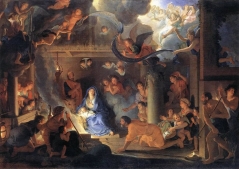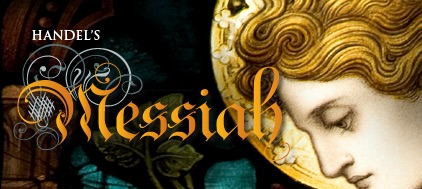Handel's Messiah at St George's in Bristol on Wednesday 14 December 2016 review

Posted on: 2016-12-16
Our rating:
A monumental, epic work by one of the Baroque period's finest exponents and given the reverential treatment it deserves by first-class musicians and singers, this performance of Handel's Messiah was a phenomenal, euphoric early-opened Xmas present.
Like a mug of warm mulled cider on a cold winter's evening, Handel's Messiah - performed with the usual superlative musical mastery of the Bristol Ensemble and The Choir of Royal Holloway - filled everyone with that unmistakably radiant, comforting pre-Christmas glow at St George's in Bristol on Wednesday 14 December 2016.

As the music-loving multitudes (pleasingly spanning young to old) took to their seats, there was a very real, palpable sense of an event about to unfold. No small wonder. Handel's Messiah here has become a reputable standard and as much a reliable festive staple as trimmings, turkey and over-cooked sprouts. It's the perfect venue too: beautiful, intimate and possessed of sensational acoustics.
The towering masterwork was composed in 1741 and written by Handel in an undeniably impressive 24 days and incorporates extracts from the authorised version of the Bible and the Book of Common Prayer, using a libretto by Charles Jennings. Divided into three parts - expectation of the Christ's arrival; sacrifice, suffering and resurrection; redemption and immortality - it was first performed in Dublin in 1742 to what could only be best described as a like-warm reception.
Time, of course, has since gone on to acknowledge and ratify the piece for the unquestionably colossal and inspiring, genius work of art it clearly is, and it's gone on to become one of the most frequently performed choral pieces of the modern concert hall repertoire.
In a nice break form the usual shackles of traditional performance, members of the choir positioned themselves at regular intervals around the venue so that the audience was encircled by the beautiful, often hauntingly mellifluous cadences of their stunning voices. As a result, it gave the entire piece an added layer of depth, a sense of vibrancy and dynamism that enhanced the work to an often goosebump-inducing degree, as well as creating a more involving, immersive concert experience.
What it also did was give many of the first-class soloists a chance to shine in their own well-deserved and talented spotlight, creating an overall performance which adeptly combined orchestral ensemble, choir and individual voices to sumptuously enchanting and mesmerizing effect. The piece lived, breathed, ebbed, flowed, carried you away on its tide of numinous beauty and bristled with an irrepressible, raw musical freshness and energy.
Conductor Rupert Gough and leader Roger Huckle kept proceedings impeccably controlled and tight throughout, leading everyone consummately through the epic 2 hour 15 minutes work and all its demanding, fluctuating ranges of tempo, rhythm and dynamics. And in-keeping with tradition (started, incidentally, by King George II), everyone stood resolutely to their feet as soon as the choir belted out the ennobling and triumphant Hallelujah Chorus.
That Handel's Messiah is one of the most important, influential and oft-performed masterpieces of the modern concert programme is undeniable and inescapable. That The Bristol Ensemble and The Choir of Royal Holloway crafted their highly anticipated perennial performance at St George's with a total understanding, commitment and passion for the work is equally irrefutable. An imposing, gargantuan work performed by faultless instrumentalists and singers.
It's a composition on an intimidatingly massive scale that wrings out every conceivable emotion, from the heroic to the introspective to the melancholy to the exultant to the intense to the joyous, and the players took everyone on that powerful, deeply moving musical journey.
Interestingly, despite its subject and source material, Handel's Messiah has never really been considered a religious composition, and certainly during the composer's time it was more often performed in secular venues rather than consecrated ones. Nevertheless, whatever your religious inclinations - and perhaps weighted by the fact it was performed in an old church - the work still carries an inescapable sense of divine grandeur and celestial transcendence.
A monumental, epic work by one of the Baroque period's finest exponents and given the reverential treatment it deserves by first-class musicians and singers, this performance of Handel's Messiah was a phenomenal, euphoric early-opened Christmas present.
5/5
bristol reviewer 212
Article by:


